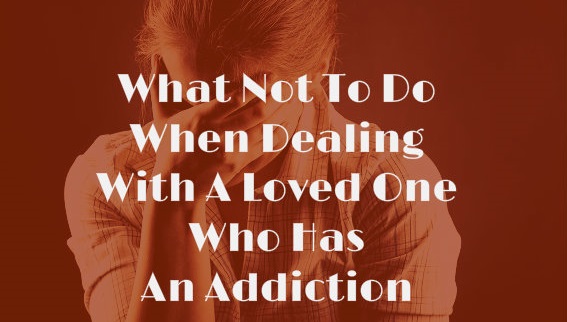How To Handle A Loved One With An Addiction – Part 1
There is no easy way to approach, handle or talk to a loved one struggling with addiction.
If you have an addict in your life, expect it to be difficult, awkward and uncomfortable. There will be good days and bad days, there will be small successes followed by perhaps greater setbacks. You will be pushed to your emotional limit and you will be forced to face your own inability to change a person you love. You will be wholly incapable of making him see that what you want is what’s best for him.
Helping Those Dealing With Addicts
Dealing with addicts isn’t intuitive. We don’t simply discern how to get through to them or how to interact with them based on common sense or reason. While respecting addicts as people, it will help the non-addicts in their midst to understand that reason, good sense, morality and self-preservation are no longer part of a framework within which they operate or a common ground upon which to meet.
But that doesn’t mean we write addicts off as crazy and give up hope. Having been an addict myself, I had a lot of people around me trying to help or cure or fix me in different ways. From the vantage point of recovery, I can now look back and comment on what was helpful and what wasn’t. Even a decade later, I remember how the people around me treated me when I was drowning in the despair of my addiction. While nothing you say will make or break an addict’s chances of recovering, there are ways of communicating and interacting that are harmful and pain-inducing, and there are better, more helpful ways of trying to relate to a person who is indeed quite sick.
What Not To Do When Dealing With An Addict
Guilt Trips
Yes, the addict is making everyone’s life difficult and causing a lot of unnecessary pain and suffering. She breaks plans, she fails to keep her commitments, she is unreliable and unpredictable. And guess what: she already knows it. Asking things like, “Do you realize what you are doing to your mother?” or, “Don’t you understand how you are hurting us?” are not helpful. The addict, though selfish in the extreme, is not oblivious to the pain, difficulty and chaos she is bringing into the lives of those around her. But she is not able to stop it. A guilt trip presupposes that the person being guilted is acting deliberately or out of malice. It assumes that he or she has some control over the offending behavior. An addict does not.
Bargaining
You’ll do anything, make any promise, as long as the addict will agree to stop the addiction and get help. But the addict is powerless to take you up on that offer. The addiction is boss. As appealing as your offer might be, it simply isn’t possible. Addicts are known for high-stakes gambling. They gamble their families, their jobs and anything good they can claim. They know what they have to lose and they do it anyway. They don’t do it because they don’t care; they do it because the illness is in fact that powerful and enslaving.
Endless Pleading And Cajoling
This is also known as nagging and it is never helpful or effective. It’s not that the addict doesn’t care, it’s that she cannot stop what she is doing on the basis of your wishes—even if she wanted to. The disease is a lot stronger than that. It’s a lot stronger than she is. In the end, the addict may tell you what you want to hear, but then go back to business as usual. She knows you think there is a problem. You don’t have to continue to restate it.
Implying Fault Or Agency
Loved ones must burn into their minds that both substance and process addictions are not choices that the addict is making. As a result, blaming addicts or implying that they are practicing their addiction simply because they are selfish and unloving is not only incorrect, but cruel. Understand that the addict is in the grip of something much bigger than him or herself. Addiction is an illness like diabetes or cancer. You may hope that addicts will take the appropriate steps to manage the condition, but it is unhelpful to imply that they do what they do on purpose.
Ignoring The Issue
If there is nothing that can be said to make an addict want to seek help, and if the nagging and the pleading are ineffective, does that mean it’s better to say nothing at all? Is it better to ignore the issue, make the best of it or hope it all just goes away? No. Something does indeed need to be said and maybe even done, but the ways in which you speak and act hold the difference between showing genuine love and support, and being a nuisance and a nag.
While your words and expressions of concern may not effect immediate change in the addict’s life, while they may not leave your chat promising to check into treatment, the addict will benefit from the knowledge that you cared enough to say something out of concern and love. Don’t pretend there isn’t a problem.
If you or a loved one is seeking help for
addiction, give us a call at 1-800-513-5423
